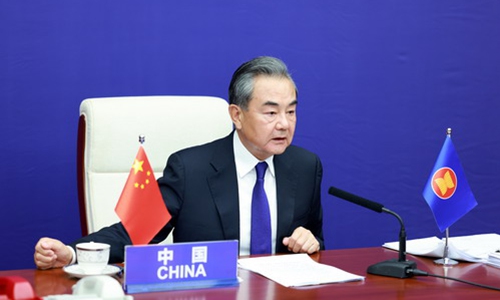
Chinese State Councilor and Foreign Minister Wang Yi. Photo: fmprc.gov.cn
Further integration among ASEAN, Japan, South Korea and China is vital to the region, particularly as many Asian countries are facing economic challenges amid the recent coronavirus resurge, experts said on Wednesday, following Chinese State Councilor and Foreign Minister Wang Yi's latest call for more cooperation among the region's countries.Wang called for "economic integration" among ASEAN, Japan, South Korea and China amid the pandemic crisis. He made the comment at the 22nd ASEAN Plus Three Foreign Ministers' Meeting, which was held by video on Tuesday.
During the meeting, Wang stressed specific directions where Southeast Asian countries should cement their cooperation. For one thing, he urged countries to take the 10+3 cooperation mechanism's 25th anniversary as an opportunity to formulate a 2023-2027 work plan, in order to plan ASEAN, China, Japan and South Korean's future roadmap of cooperation.
Li Haidong, a professor at the Institute of International Relations of China Foreign Affairs University, told the Global Times on Wednesday that Asia stays cohesive based on the principle of mutual benefits, and the 10+3 mechanism is at the core of regional cooperation.
"With the mechanism, the region can mobilize resources and wisdom to jointly combat the impact of the continuous COVID-19 pandemic, while overcoming economic difficulties," Li said.
Wang also elaborated upon the direction of East Asia's economic cooperation in the future. For example, he said the countries should strive to implement the Regional Comprehensive Economic Partnership (RCEP) as soon as possible to speed up the process of regional economic integration.
He called for building a barrier against the pandemic in East Asia. According to Wang, China has provided over 750 million doses of COVID-19 vaccines to other countries and regions, and will provide additional 110 million doses in the next four months, as well as providing $3 billion in aid.
Wang also called on regional countries to accelerate regional digital transformation, make good use of East Asian countries' market size, and vigorously carry out practical cooperation on artificial intelligence and digital economy.
Gu Xiaosong, dean of the ASEAN Research Center under the Hainan Tropical Ocean University, said that many Southeast Asian countries, like Vietnam, are likely to fail to meet their economic targets this year with the coronavirus resurgence, as those countries are highly dependent on manufacturing which is affected by the pandemic.
According to media reports, Apple and Samsung suppliers in Vietnam are making local workers sleep on factory floors to keep the industry rolling while preventing pandemic resurgence, which experts said reflects those countries' dependence on Original Equipment Manufacturer business.
"Whether those supply chains would be unharmed depends on how the pandemic will evolve in the next few months. If the pandemic is not controlled, it's possible that many supply chains might move out of Vietnam, and the economic losses will be huge," Gu said, saying that the case applies to other Asian countries like Indonesia as well.
Under such circumstances, it's vital that those countries strengthen cooperation with China, one of the few countries whose trade and economic situation remains relatively undisturbed, experts said.
"China's trade and investment could help many countries offset their economic losses amid the pandemic while kick-starting economic recovery. On the other hand, China is virtually the only country which has the inclination to churn out a large number of vaccines and ready to donate them without any additional political conditions," Gu said.
The RCEP, which provides a cooperative framework under which preferential policies like zero tax will be rolled out, will cement Asia's economic interaction, experts said.
They also stressed that the economic integration between China and many Asian countries has already grown so tight that it can't be harmed by external disruption, like the US provocation or protectionist calls.
"Not only has China and ASEAN developed close ties in labor division of industry chains, but also China has grown to be a key market for many Asian countries, such as the Philippines' agriculture products. For export-orientated countries, they will not drift apart from China just because of external pressure," Liu Xiaoxue, an associate research fellow at the National Institute of International Strategy under the Chinese Academy of Social Sciences, told the Global Times.






